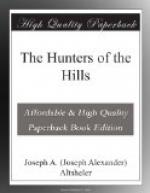The Ojibway was in full war paint, and the luminous quality of the moon’s rays enlarged his huge form. He towered like Hanegoategeh, the Evil Spirit, and the figures upon his shoulders and chest stood out like carving. He and the two warriors also carried bows and arrows, and Tayoga surmised that they had meant to slay in silence. His heart burned with rage and he felt, too, an unlimited daring. Did he not have the promise of Tododaho that he should pass through all dangers and receive great rewards? He felt himself a match for the three, and he did not need secrecy and silence. He raised his voice and cried:
“Stand forth, Tandakora, and fight. I too have only waano (the bow) and gano (the arrow), but I meet the three of you!”
Tandakora and the two warriors sprang back and in an instant were hidden by the trees, but Tayoga had expected them to do so, and he dropped down, moving silently to another and hidden point, where he waited, an arrow on the string. He knew that Tandakora had recognized his voice, and would make every effort, his shoulder healed enough for use, to secure such a prize. The Ojibway would believe, too, that three must prevail against one, and he would push the attack. So the Onondaga remained motionless, but confident.
Nearly ten minutes of absolute silence followed, but his hearing was so acute that he did not think any of the three could move without his knowledge. Then a slight sliding sound came. One of the warriors was passing to the right, and that, too, he had expected, as they would surely try to flank him. He moved back a little, and with the end of his bow shook gently a bush seven or eight feet away. In an instant, an arrow, coming from the night, whistled through the bush. But Tayoga drew back the bow quick as lightning, fitted an arrow to the string and shot with all the power of his arm at a bronze body showing among the leaves at the point whence the arrow had come.
The shaft sang in the air, and so great was its speed and so short the range that it passed entirely through the chest of the warrior, cutting off his breath so quickly that he had no time to utter his death cry. There was no sound but that of his fall as he crashed among the leaves. Nor did Tayoga utter the usual shout of triumph. He sank back and fitted another arrow to the string, turning his attention now to the left.
It had been the Onondaga’s belief that Tandakora would remain in front, sending the warriors on either flank, and now he expected a movement on the left. He did not have to make any feint of his own to draw the second warrior, who must have been lacking somewhat in skill, as he presently saw a dim figure in the bushes and his second arrow sped with the same speed and deadly result that had marked the first. Fitting his third arrow to the string, he called:
“Stand forth, Tandakora, and show yourself like a man! Then we shall see who shoots the better!”




